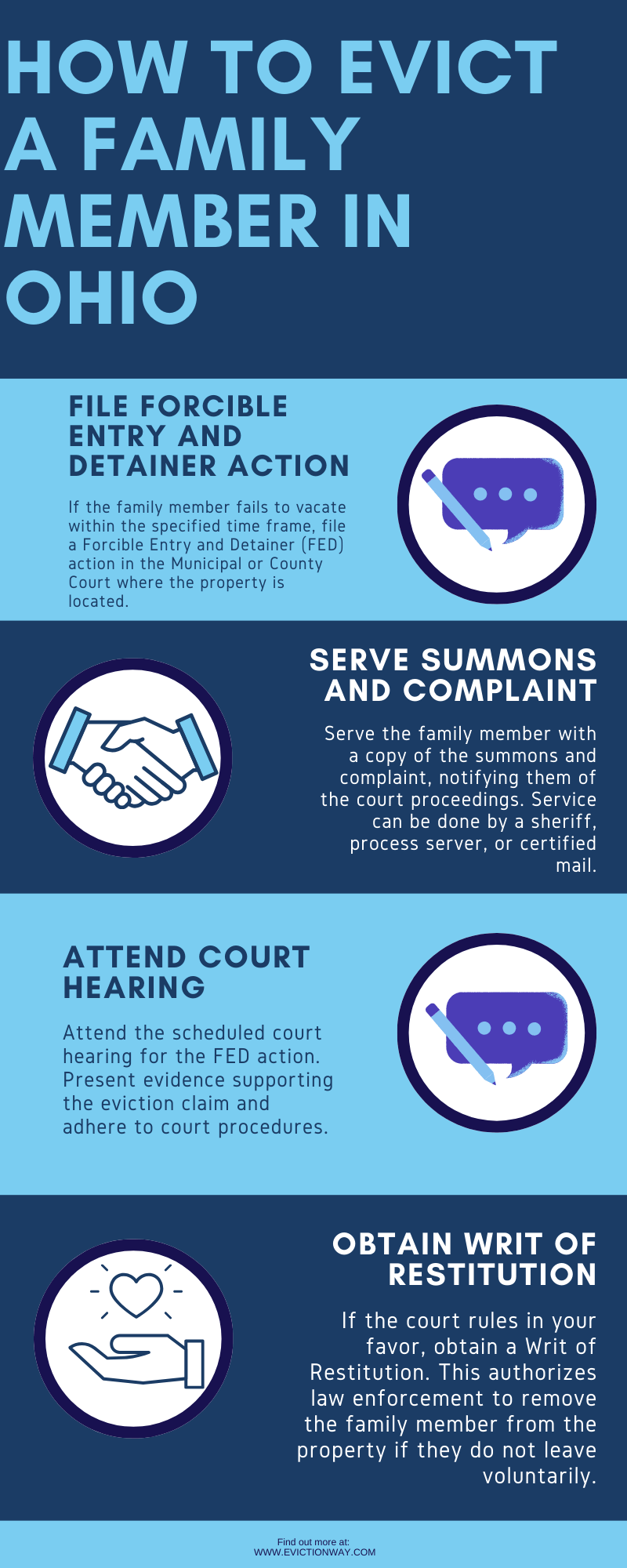Evicting a family member can be a difficult and emotional process, but it may be necessary to protect your rights and property. In this blog post, we will discuss how to evict a family member in Ohio. We will share the best way to evict a family member in Ohio, and we will tell you the method to evict them. We will also share tips on removing a family member politely, the laws involved, and legal tips.
If you are considering evicting a family member, it is important to seek legal advice. An attorney can help you understand your rights and options, and can guide you through the eviction process. Evicting a family member can be a difficult process, but it is important to remember that you have rights as a property owner. If you are being harassed or threatened by a family member, you may need to take legal action to protect yourself.

Evicting a family member can be a difficult and emotional process, but it is important to remember that you are not alone. There are resources available to help you through this process. If you are considering evicting a family member, please reach out to an attorney or legal aid organization for assistance.
How To Evict a Family Member In Ohio
Evicting a family member can be a difficult and emotional process, but it is sometimes necessary to protect your rights and property. If you are considering evicting a family member in Ohio, it is important to understand the legal process and your rights as a landlord.
1. Determine If You Have Grounds for Eviction
In Ohio, there are several grounds for eviction, including:
- Nonpayment of rent
- Violation of the lease agreement
- Criminal activity
- Damage to the property
- Nuisance behavior
If you believe that your family member has violated any of these grounds, you can begin the eviction process.
2. Give Proper Notice
Before you can evict a family member, you must give them proper notice. The notice period varies depending on the reason for eviction. For example, if you are evicting for nonpayment of rent, you must give 3 days’ notice. If you are evicting for a lease violation, you must give 30 days’ notice.

3. File an Eviction Complaint
If your family member does not vacate the property after you have given them notice, you can file an eviction complaint with the court. The complaint must state the grounds for eviction and the amount of rent owed, if any.
4. Attend the Eviction Hearing
Once you have filed an eviction complaint, the court will schedule an eviction hearing. At the hearing, you will have the opportunity to present your case and your family member will have the opportunity to defend themselves.
5. Obtain a Judgment
If the court finds in your favor, it will issue an eviction judgment. The judgment will order your family member to vacate the property within a certain period of time.
6. Enforce the Judgment
If your family member does not vacate the property after the judgment has been issued, you can have the judgment enforced by the sheriff. The sheriff will remove your family member from the property and return possession to you.

How Much Does it Cost to Evict a Family Member in Ohio?
Evicting a family member can be a difficult and expensive process. The cost of eviction will vary depending on the specific circumstances of the case, but there are some general costs that you can expect to incur.
| Description | Approximate Cost (USD) |
|---|---|
| Filing Fee | $50 – $150 |
| Service of Process | $15 – $50 |
| Attorney Fees | $250 – $1,000+ |
| Set Out Fee (if sheriff enforces move) | $50 – $300 |
- Filing fees: The first step in the eviction process is to file a complaint with the court. The filing fee for an eviction complaint in Ohio is $105.
- Service of process: Once the complaint is filed, it must be served on the tenant. The cost of service of process will vary depending on the method of service.
- Attorney fees: If you hire an attorney to represent you in the eviction process, you will be responsible for their fees. Attorney fees can vary widely, so it is important to get a quote from an attorney before hiring them.
- Court costs: In addition to the filing fee, you may also be responsible for other court costs, such as the cost of a hearing or a trial.
- Moving costs: If the tenant is evicted, you will be responsible for the cost of moving their belongings out of the property.
FAQs: Evicting a Family Member in Ohio
Here are some of the most frequently asked questions about evicting a family member in Ohio:
What are the grounds for evicting a family member in Ohio?
In Ohio, you can evict a family member for violating the terms of their tenancy, such as not paying rent or breaking the lease. You can also evict a family member if they are causing damage to the property or engaging in illegal activities.
How do I start the eviction process?
To start the eviction process, you must give your family member a written notice to vacate the property. The notice must state the reason for the eviction and the date by which they must leave. If your family member does not vacate the property by the deadline, you can file an eviction lawsuit with the court.
What happens if my family member refuses to leave?
If your family member refuses to leave after you have filed an eviction lawsuit, the court will issue a writ of possession. This writ gives the sheriff the authority to remove your family member from the property.

Can I evict a family member who is a minor?
Yes, you can evict a family member who is a minor. However, the eviction process is different for minors than it is for adults. You must file a petition with the court and prove that the minor is causing harm to themselves or others.
What are some tips for evicting a family member?
Here are some tips for evicting a family member:
- Document everything: Keep a record of all communications with your family member, including any notices to vacate and court filings.
- Be prepared to go to court: If your family member does not vacate the property voluntarily, you will need to file an eviction lawsuit.
- Get help from a lawyer: An attorney can help you with the eviction process and ensure that your rights are protected.
Related:
